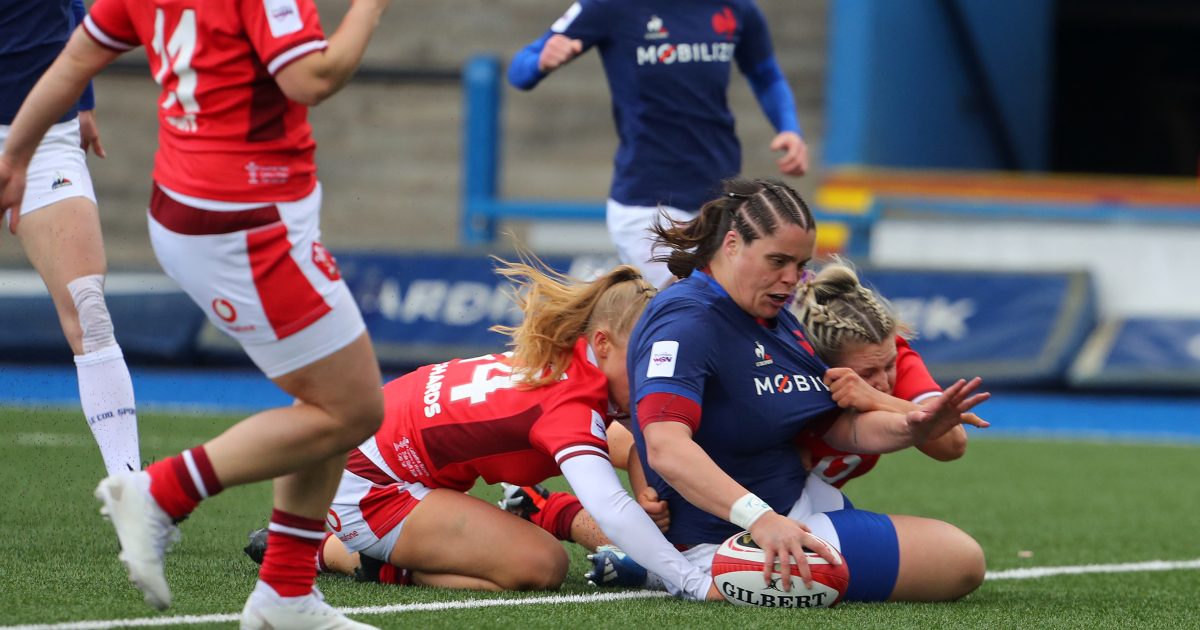
Au pays de Galles, les Bleues en marche avant toute

La finale France – Angleterre tant attendue aura bien lieu. Larges vainqueurs du pays de Galles ce dimanche (0-40), les Bleues ont imité les Anglaises qui avaient pulvérisé l’Irlande la veille (88-10). Avec quatre victoires chacune, les deux équipes se disputeront donc la victoire finale dans le Tournoi 2024, agrémenté du Grand Chelem, samedi prochain à Bordeaux.
Mais pour s’offrir cette affiche, l’équipe de France a dû se débarrasser du pays de Galles. On ne doutait pas de la capacité des Françaises à écarter des Galloises en souffrance (seule équipe sans victoire à ce jour), mais on attendait surtout la confirmation de la victoire enfin convaincante, décrochée la semaine dernière contre l’Italie, après deux victoires inaugurales (Irlande, Écosse) qui avaient laissé tout le monde sur sa faim.
A vrai dire, il y a eu de tout dans ce match. Du très bon, avec la mêlée, l’activité des avants, l’efficacité offensive et défensive, ou l’intégration des septistes (Ciofani, Grisez). Du moins bon aussi, avec ces difficultés en touche ou sur les mauls, et une certaine indiscipline (trois cartons jaunes).
Les Galloises pourront même s’en vouloir de terminer ce match à zéro point. Elles ont pourtant eu des occasions, ont occupé le camp français plus que de coutume, ont caressé la ligne d’essai à plusieurs reprises.
Notamment dès l’entame de match. On ne jouait que depuis deux minutes quand Anne-Cécile Ciofani écopait d’un carton jaune pour un contact épaule-tête, à l’occasion de sa première sélection à XV.
Mais avec une Pauline Bourdon-Sansus à la baguette, qui jouait deux fois rapidement (une pénalité puis une touche), Lina Queyroi servait Annaëlle Deshayes lancée. La pilière, d’ailleurs élue meilleure joueuse du match, couvrait les 20 m restants pour marquer alors que son équipe jouait à 14 contre 15 (0-7, 11e).
Rebelote cinq minutes plus tard. Les locales pilonnaient la ligne française depuis deux minutes quand Joanna Grisez interceptait la dernière passe galloise et faisait parler ses jambes de septiste sur 100 m (0-14, 16e). Elle récidivera en tout fin de match, pour une 2e interception synonyme de doublé (0-40, 79e).
A la 20e minute, on était pourtant à 70% de possession pour les filles de Cardiff ! Mais dominer et marquer sont deux choses bien différentes, les Françaises pourraient en parler, en référence à leurs premiers matchs dans le Tournoi.
Et sur une mêlée, le gros point de satisfaction de l’après-midi, les Bleues récupéraient le cuir. La N.8 Teani Feleu se faisait la malle petit côté et transmettait à sa coéquipière de la 3e ligne Romane Ménager qui terminait le boulot (0-19, 31e).
« On subit un peu, mais ce qui est très positif c’est que dès qu’on a un ballon, on rentabilise », jugeait justement Ménager à la mi-temps au micro de France Télévisions, orpheline de sa jumelle Marine, forfait sur commotion.
Les Bleues repartaient en 2e mi-temps toujours portées par leur pack. C’est d’une nouvelle mêlée dévastatrice que Bourdon-Sansus lançait Gabrielle Vernier qui, tout en appuis, atteignait la terre promise pour l’essai du bonus offensif (0-26, 45e).
Puis la capitaine Manae Feleu marquait à son tour d’un pick&go, parachevant la démonstration des avants françaises (0-33, 58e).
Grisez fermait le tableau de marque dans les dernières minutes, mais c’est bien la performance du pack qui reste à l’esprit. Il faudra être capable de refaire un tel match, d’être aussi efficace aussi bien défensivement qu’offensivement tout en réglant les problèmes en touche, pour espérer faire tomber les Anglaises, vainqueurs de leurs 28 dernières sorties dans le Tournoi des Six Nations.










































